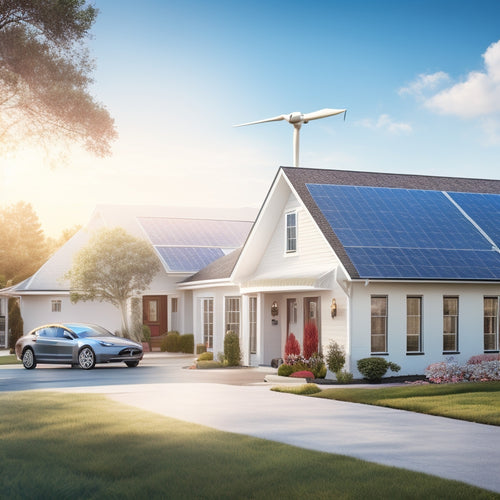
What Is the Cost of a Storage Battery for Solar Panels on a Budget
Share
When shopping for a storage battery for your solar panels on a budget, you'll find affordable options from brands like Renogy, Anker, and Jackery, offering varying levels of performance and efficiency. The cost of a storage battery can range from $5,000 to $15,000, depending on the technology, capacity, and brand, with installation fees adding another $1,000 to $3,000. Understanding the factors that affect storage cost, such as depth of discharge and system configuration, is key to making an informed decision. As you assess your options, you'll reveal more ways to optimize your investment and maximize your savings – and it's worth uncovering the details that matter most to your specific needs.
Key Takeaways
- Budget-friendly storage battery brands include Renogy, Anker, and Jackery, offering varying performance and affordability options.
- Factors affecting storage cost include battery technology, efficiency ratings, depth of discharge, and brand reputation.
- Battery capacity and pricing are closely tied, with higher capacity ratings leading to larger batteries and increased costs.
- System configuration, including inverter and charge controller, impacts overall cost, with prices ranging from $1,500 to $7,000.
- Average cost of a storage battery ranges from $5,000 to $15,000, with installation fees adding an additional $1,000 to $3,000.
Budget Friendly Battery Options
When considering solar panels, budget-friendly battery options are essential for homeowners who want to store excess energy without breaking the bank.
You'll want to investigate affordable brands that offer reliable performance without sacrificing quality.
Some top contenders for budget-friendly battery options include Renogy, Anker, and Jackery. A performance comparison of these brands reveals that Renogy's batteries offer a higher depth of discharge, making them a great option for those who need to store excess energy for extended periods.
Anker's batteries, on the other hand, boast a higher power output, making them suitable for homes with high energy demands. Jackery's batteries offer a great balance between performance and affordability, making them an excellent choice for homeowners on a tight budget.
When evaluating these brands, consider your specific energy needs and the features that matter most to you.
By doing so, you'll be able to find a battery solution that meets your energy storage needs without breaking the bank.
With the right budget-friendly battery option, you can enjoy the benefits of solar energy storage without the hefty price tag.
Factors Affecting Storage Cost
Your storage battery's cost is influenced by several key factors, which can considerably impact your overall investment in solar energy.
One essential factor is the type of battery technology you choose. Different technologies, such as lithium-ion, lead-acid, and saltwater batteries, have varying price points and performance characteristics. Lithium-ion batteries, for instance, are more expensive but offer higher efficiency ratings and longer lifetimes.
Another important factor is the battery's efficiency ratings, which affect how much energy you can store and use. Higher efficiency ratings typically come at a higher cost.
You'll also need to take into account the battery's depth of discharge (DOD), which affects how much of the battery's capacity you can use without damaging it. A higher DOD often means a higher upfront cost.
Additionally, the brand, model, and warranty of the battery can impact its cost. Established brands with longer warranties may charge more, while newer brands with shorter warranties might be more affordable.
Understanding these factors will help you make an informed decision when selecting a storage battery for your solar panel system.
Battery Capacity and Pricing
You're likely wondering how the capacity of your storage battery affects its pricing. The answer lies in the type and capacity of the battery you choose. Different battery types, such as lead-acid, lithium-ion, and saltwater batteries, have varying capacity ratings that impact their cost.
Here are three key factors to evaluate:
-
Capacity ratings: A higher capacity rating means a larger battery that can store more energy. This typically results in a higher upfront cost. For example, a 10 kWh battery will cost more than a 5 kWh battery.
-
Battery types: Different battery types have varying price points. Lithium-ion batteries, for instance, are generally more expensive than lead-acid batteries.
-
Depth of discharge (DOD): The DOD refers to how much of the battery's capacity can be safely used. A higher DOD means you can use more of the battery's capacity, which can affect pricing.
When selecting a storage battery, evaluate your energy needs and budget. A larger capacity battery may provide more energy storage, but it may also come with a higher price tag.
System Configuration and Cost
Two key components of a solar panel system's cost are the inverter and the charge controller, which affect the overall system configuration and cost. These components determine how efficiently your solar panels generate energy and how effectively it's stored in your battery.
When choosing a system configuration, you'll need to evaluate the type of inverter and charge controller that best suits your energy needs. For example, if you want to power your home during a grid outage, you'll need an inverter that can handle both grid-tie and off-grid functionality.
Here's a breakdown of the costs associated with different system configurations:
| System Type | Cost Range |
|---|---|
| Grid-Tie Only | $1,500 - $3,000 |
| Off-Grid Only | $2,000 - $4,000 |
| Hybrid (Grid-Tie + Off-Grid) | $3,500 - $6,000 |
| AC-Coupled (Grid-Tie + Energy Storage) | $4,000 - $7,000 |
Keep in mind that these costs are estimates and can vary depending on the specific components and brands you choose. However, by understanding the different system types and their associated costs, you can make an informed decision about which configuration is right for you and your budget.
Installation and Maintenance Fees
When evaluating the overall cost of a storage battery for solar panels, it's crucial to contemplate the installation and maintenance fees associated with your chosen system configuration.
These costs can add up quickly, so it's vital to factor them into your budget.
The installation process typically includes the following fees:
-
Labor costs: This includes the cost of hiring a licensed electrician to install the battery system, which can range from $500 to $2,000 depending on the complexity of the installation.
-
Permitting and inspection fees: These fees vary by location, but you can expect to pay around $100 to $500 for the necessary permits and inspections.
-
Mounting and hardware costs: This includes the cost of mounting the battery system, which can range from $500 to $1,000.
To minimize maintenance costs, follow these maintenance tips: regularly inspect the system for signs of wear and tear, keep the battery terminals clean, and make certain the system is operating within the recommended temperature range.
Long Term Savings and Value
You'll start seeing long-term savings and value from your storage battery for solar panels in two key areas.
First, you'll notice lower monthly bills since you'll be relying more on your stored solar energy and less on the grid.
Additionally, your property value will increase, making your home more attractive to potential buyers if you decide to sell in the future.
Lower Monthly Bills
By investing in a solar panel system with a storage battery, one can greatly reduce their reliance on the grid and lower their monthly bills. This means you'll be paying less to the utility company and more to yourself in the form of energy independence.
As a renewable investment, a solar panel system with a storage battery provides long-term savings and value.
Here are three ways you can lower your monthly bills:
-
Reduce peak hour consumption: With a storage battery, you can store excess energy generated during the day and use it during peak hours when rates are highest. This reduces your reliance on the grid and lowers your bill.
-
Optimize your energy usage: A storage battery allows you to optimize your energy usage by storing energy when it's cheap and using it when it's expensive. This guarantees you're always paying the lowest rate possible.
-
Sell excess energy back to the grid: If you generate more energy than you need, you can sell it back to the grid and receive a credit on your bill. This reduces your overall energy costs and increases your energy independence.
Increased Property Value
As a homeowner, investing in a solar panel system with a storage battery can considerably enhance your property worth, providing long-term savings and worth that extends beyond your current ownership.
This increase in property worth can be attributed to the benefits that come with energy independence. With a storage battery, you're not only generating your own clean energy but also storing it for later use, reducing your reliance on the grid. This feature is highly attractive to potential buyers, making your property more desirable in the property market.
Studies have shown that homes with solar panel systems sell for a premium, with some buyers willing to pay up to $15,000 more for an energy-efficient property.
As you consider investing in a storage battery, remember that it's not just about the immediate savings on your monthly energy bills. You're also making a savvy long-term investment in your property, which can lead to increased resale worth and a stronger position in the property market.
Frequently Asked Questions
Can I Use a Storage Battery With an Existing Solar Panel System?
You can integrate a storage battery with your existing solar panel system, optimizing battery integration to enhance solar efficiency, but guarantee compatibility and assess your system's capacity to accommodate the added component.
Are Storage Batteries Compatible With All Solar Panel Brands?
As you traverse the solar environment, you'll find that storage batteries aren't universally compatible, just like Romeo and Juliet's star-cross'd families. Different battery types, such as lead-acid or lithium-ion, may pose compatibility issues with certain solar panel brands, so it's essential to research and guarantee harmonious pairing.
Can I Install a Storage Battery Myself to Save Money?
You can attempt a DIY installation, but be aware that it may void warranties and compromise safety; hiring a professional guarantees compliance and ideal performance, while potentially sacrificing some cost savings from a DIY approach.
How Long Does a Storage Battery Typically Last Before Replacement?
As you commence your solar expedition, you'll find that a storage battery typically lasts around 10-15 years before needing replacement, with replacement costs ranging from $5,000 to $15,000, depending on the type and quality of the battery.
Are There Any Government Incentives for Storage Battery Purchases?
You can benefit from federal tax credits and state rebates when purchasing a storage battery, greatly reducing the upfront cost. Research the Solar Investment Tax Credit (ITC) and local incentives to maximize your savings and make your investment more affordable.
Conclusion
As you weigh the cost of a storage battery for your solar panels, remember that investing in a budget-friendly option today can mean energy independence and long-term savings tomorrow. While upfront costs may seem intimidating, consider that a battery can increase your solar panel system's efficiency by up to 90% and provide backup power during outages. So, don't let sticker shock hold you back - a storage battery can pay for itself in the long run, and then some.
Related Posts
-

Charging Points in Rural Areas: 5 Key Insights
When driving through rural areas, you'll face a shortage of charging points, making EV ownership stressful and inconv...
-

Why Homeowners Are Embracing DIY Energy Independence
By taking control of your energy needs, you're breaking free from the uncertainty of utility bills and embracing a se...
-

10 Tips for Cleaner City Air With Scooters
By adopting a few simple habits, you can make a significant impact on reducing city air pollution with your scooter. ...


